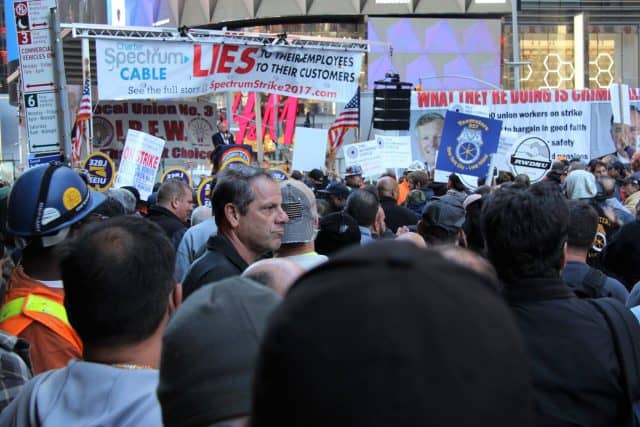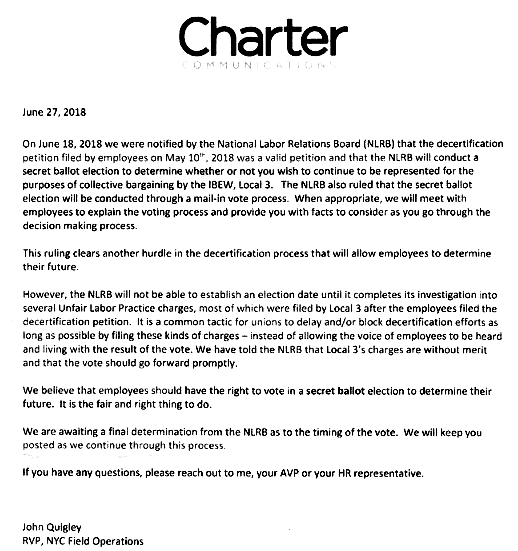 For the last year and a half, while Charter/Spectrum has been accused of dragging its feet on rural broadband rollouts across New York State and is now threatened with franchise revocation, the company had plenty of time to spare waiting out the International Brotherhood of Electrical Workers Local 3, who have been on strike to protest a pay-and-benefits-race-to-the-bottom in the New York City.
For the last year and a half, while Charter/Spectrum has been accused of dragging its feet on rural broadband rollouts across New York State and is now threatened with franchise revocation, the company had plenty of time to spare waiting out the International Brotherhood of Electrical Workers Local 3, who have been on strike to protest a pay-and-benefits-race-to-the-bottom in the New York City.
The strike has attracted attention and support from many high-profile downstate politicians, particularly New York City Mayor Bill de Blasio and Gov. Andrew Cuomo, but so far the dramatically enlarged Charter Communications, which acquired Time Warner Cable in 2016, seems comfortable waiting out the union and hoping to force workers to give up and accept to the cable company’s less generous basic benefits package.
The cost of the strike has hurt average middle class Spectrum employees far more than Charter’s top executives — particularly CEO Thomas Rutledge, who had no objections to accepting a take-home bonus and pay package worth $98 million after overseeing the company’s merger. In contrast, many striking workers have depleted their family’s savings and have sold their homes to relocate to less expensive apartments as they struggle to holdout against the nation’s second largest cable company. A few others were reportedly homeless. The union’s emergency fund has been depleted.
 The David vs. Goliath battle has also put enormous strain on some affected families. Some have quit the company and looked for employment elsewhere, some others have returned to work and abandoned the strike, leaving holdouts hoping for a breakthrough.
The David vs. Goliath battle has also put enormous strain on some affected families. Some have quit the company and looked for employment elsewhere, some others have returned to work and abandoned the strike, leaving holdouts hoping for a breakthrough.
Instead, Charter appears to have won a mysterious ally in the form of a Spectrum employee hired after the strike began in 2017. Initially the worker had a supervisory role in the company with a salary to match, but late last year strangely accepted an apparent demotion to a level three technician, while retaining his very generous managerial salary. That worker, on his own, managed to navigate a complicated procedure and cumbersome process to file a petition to decertify the union with the National Labor Relations Board. If his effort is successful, IBEW Local 3 would lose the right to negotiate for their members, which is another way of saying “break the union.”
“The guy was brought in – he’s a front, pretty much,” Staten Island mom Sanela Djencic told LaborPress. “He was brought in to bust the union.”
Not so, claims Charter.
“Charter had no involvement in the filing of the decertification petition,” Charter/Spectrum spokesperson John Bonomo flatly told LaborPress in an email. “We don’t have any further comment.”
The NLRB ruled the employee’s petition to decertify the union was valid, finding insufficient evidence to prove the worker was actually serving in a managerial capacity at the time.
In a June 27 letter to employees, John Quigley, Charter’s regional vice president of New York City field operations, was considerably less neutral about the union’s involvement in Charter’s business.

“This ruling clears another hurdle in the decertification process that will allow employees to determine their future,” Quigley wrote. “It is a common tactic for unions to delay and/or block decertification efforts as long as possible […] instead of allowing the voice of employees to be heard. We believe that employees should have the right to vote in a secret ballot election to determine their future. It is the fair and right thing to do.”

Quigley
Quigley did not comment on Charter’s own role erecting hurdles to settle the strike action, something that would also allow employees to determine their future. In fact, strikers complain companies like Charter often prefer to stall and block a fair settlement in hopes the union and its members will run out of funds before it is forced to the table to sign a new agreement.
The company’s efforts to reject union demands come at the same time it is under pressure to deliver the merger-related cost savings it promised shareholders and Wall Street as an outcome of the multibillion dollar merger deal. Cutting back on employee benefits is one way to manage that. Bringing in independent contractors, traditionally paid less and offered fewer benefits, is another. But Charter has consistently claimed it is not trying to hurt its workforce.

Scabby the Rat
“Charter did not want this strike and made multiple attempts to resolve it,” a company spokesman said. “But the union has not been a true partner in negotiations. With Local 3 refusing to even discuss the terms in Charter’s offer, we moved forward last summer and implemented wage increases and other worker benefits. Today we are putting more money into our employees’ pockets, providing them with excellent benefits, and making substantial investments to shore up their retirement benefits that are in jeopardy.”
Charter’s declarations of what is ‘fair and right’ have irritated some members of New York City government.
“Charter Communications has betrayed the public trust and is not deserving of the right to do business with our City,” said Councilman I. Daneek Miller (D-St. Albans). “Charter has an established pattern of deceit against its own workers and consumers in the name of boosting its profit margin, and it must be held accountable for its deception. Well-paying middle class jobs, healthcare and the generational security that is best achieved through union membership are core principles of our city, for which the company has demonstrated no appreciation. If Charter continues to engage in bad faith negotiations with Local 3 or sponsors any attempts to break the union, it’ll be hard pressed to persuade the council to renew its franchise agreement.”
In June, Councilman Rory Lancman (D-Hillcrest) told The Tribune, “Charter Communications has spent the past 15 months doing everything in its power to break Local 3 and boost its own bottom line. Charter’s complete disregard for its own workers and unwillingness to negotiate in good faith are beyond shameful and will not be tolerated in New York City.”


 Subscribe
Subscribe